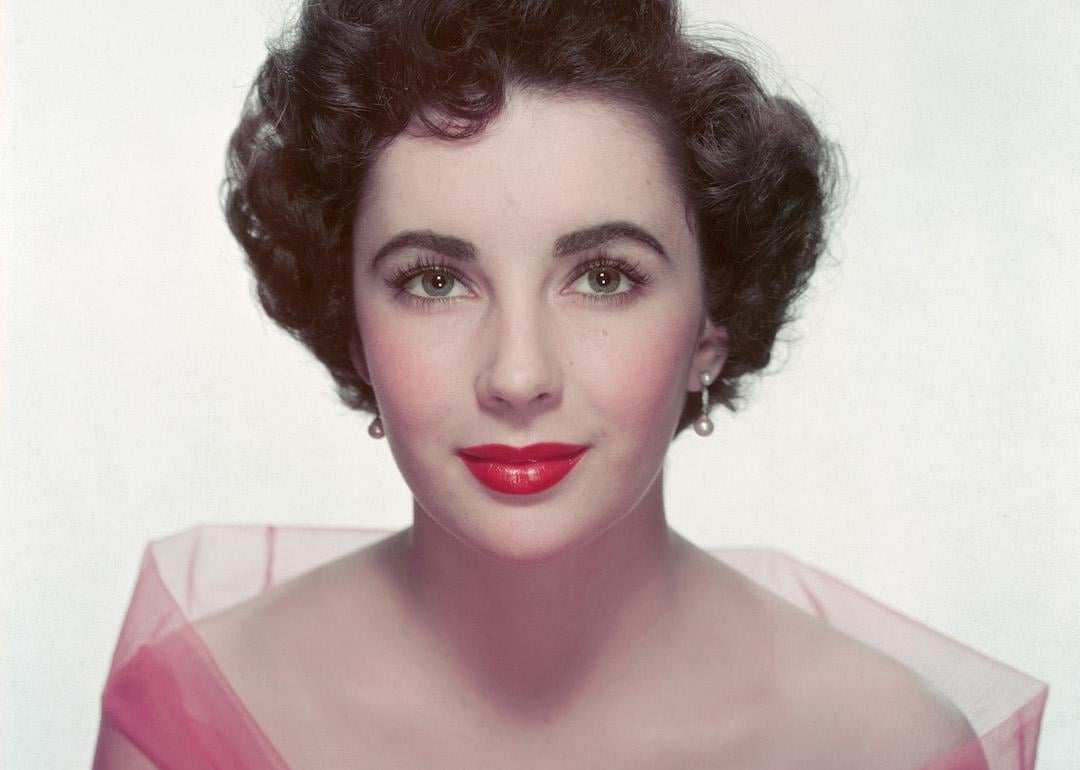
Elizabeth Taylor: The life story you may not know
Elizabeth Taylor: The life story you may not know
"I'd cry my eyes violet, Elizabeth Taylor," Taylor Swift sings on a track from her album, "The Life of a Showgirl," which dropped on Oct. 3, 2025. If you're not a Swiftie, you might not particularly care about the song, but it's yet another reminder of the enduring pop culture power of one of Hollywood's most iconic actors. Taylor—that's Liz, not Ms. Swift—is also the subject of a new three-part docuseries "Elizabeth Taylor: Rebel Superstar," which premiered on Fox Nation on Oct. 6, 2025. Nearly 15 years after her death, everyone is still talking.
The mythos surrounding Elizabeth Taylor has long been larger-than-life. There was always something about her that gripped the cultural imagination, in both life and death. Her legendary violet eyes (the very same cited by Taylor Swift), her penchant for priceless jewels, her eight marriages, and the sometimes volatile and scandalous nature of her relationships all coalesced to form Taylor's public image, rendering her highly visible and, at the same time, unknowable. Taylor's stardom redefined the cultural idea of what celebrity meant, pioneering our modern conceptions of the word: complete with paparazzi, publicly scrutinized and adored relationships, struggles with addiction, and use of her platform for activism.
Perhaps one of Taylor's most remarkable legacies was her ability to understand her own influence and, to a certain extent, shape her own narrative during a time when big Hollywood studios famously micromanaged actresses' every move. To memorialize Taylor's remarkable life—and to separate fact from fabrication—Stacker compiled a list of 15 important moments and relationships from Taylor's life via interviews, biographies, and news reports.
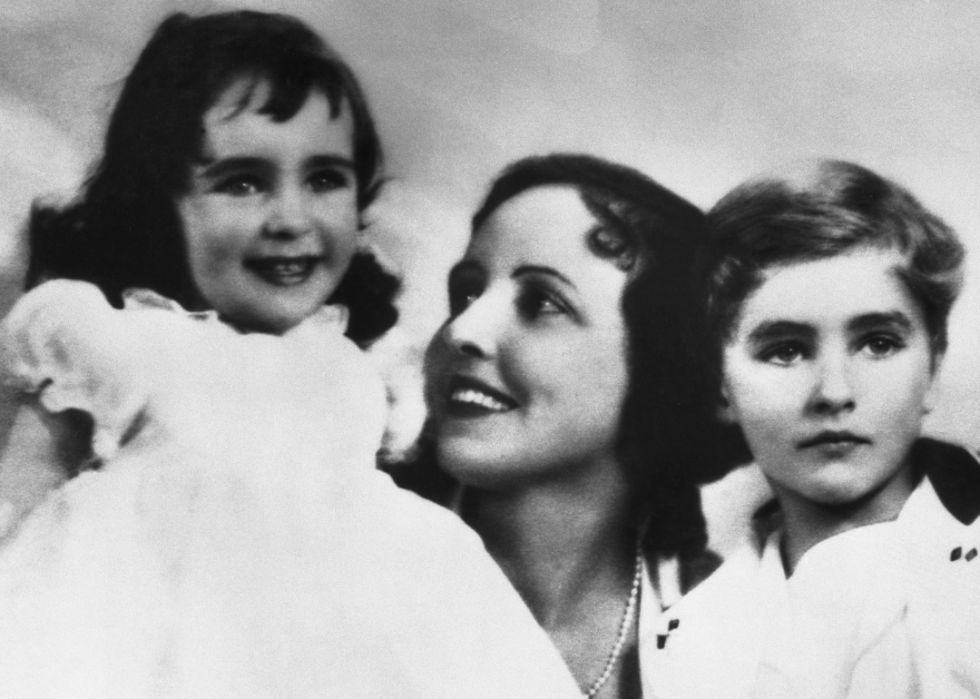
1932-39: Born in London to American parents
Elizabeth Taylor was born on Feb. 27, 1932, in north London. Her parents both hailed from the U.S. and were no strangers to the art and theater world; her father, Francis, was an art dealer, and her mother, Sara, a former stage actress. She was raised a Christian Scientist and did ballet from the time she could walk. A few months before the outbreak of World War II, the family packed up and moved to Los Angeles.
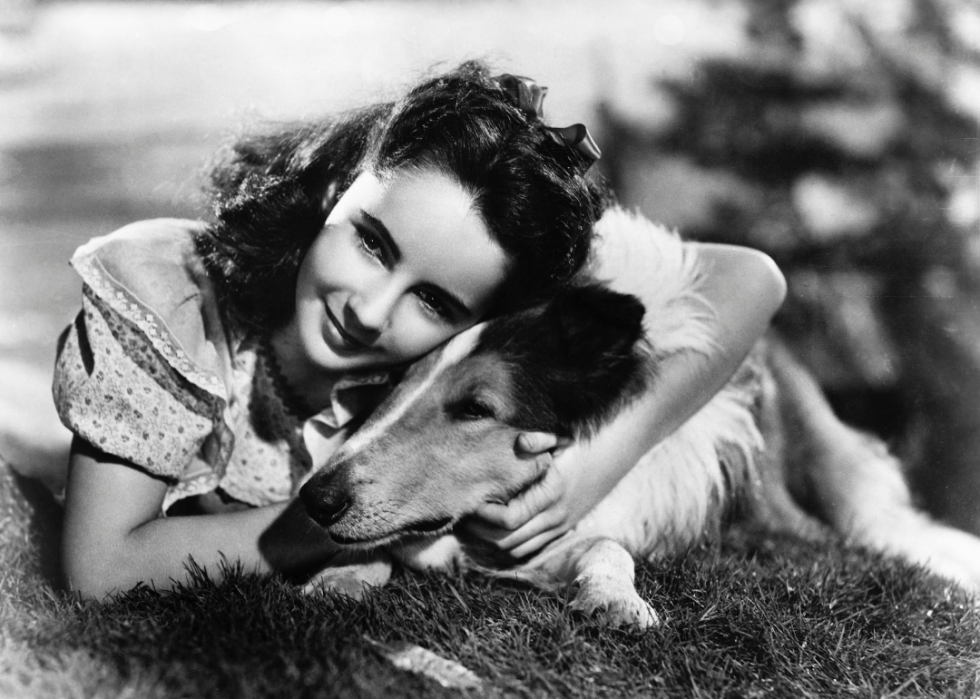
1939: Starting a life in Los Angeles
When the Taylor family arrived in Los Angeles, Elizabeth's father opened an art gallery, which became a favorite of film industry personnel. It was here that she was discovered, making her screen debut in 1942's "There's One Born Every Minute" at age 10. In 1943, Taylor signed a contract with MGM, making several more films over the next few years. When she was 16 or 17, Howard Hughes—who had been 44 at the time—used his lawyer to try to bribe Taylor's mother with $1 million to marry her, which Taylor reportedly found comical.
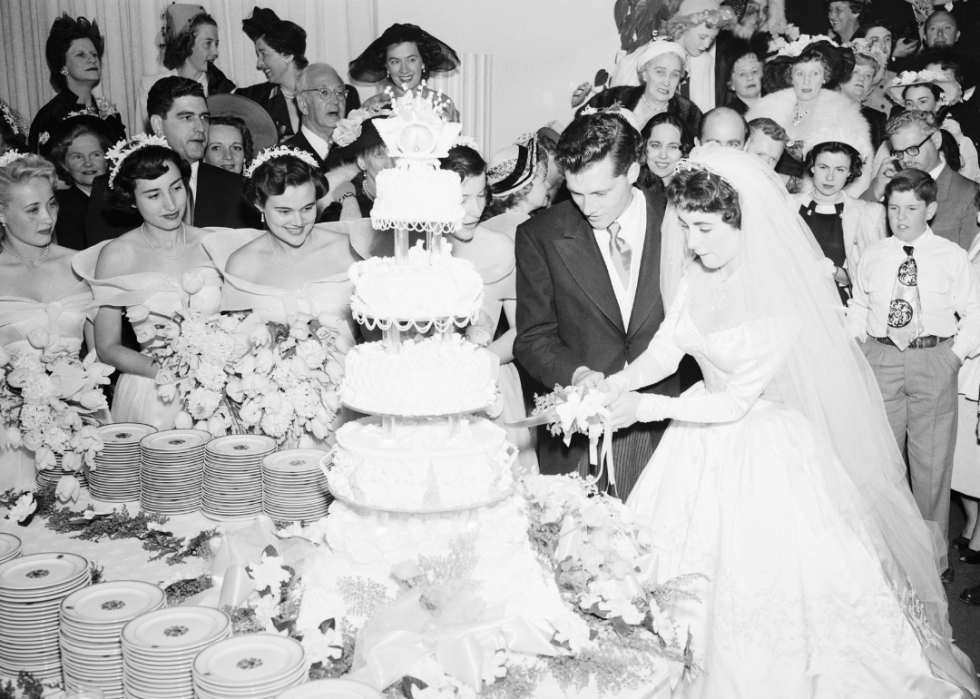
1950: First marriage at 18
Taylor met Conrad "Nicky" Hilton Jr.—son of the Hilton hotel magnate Conrad Hilton and Paris Hilton's future great-uncle—at age 17 at a nightclub in LA; they married less than a year later. The wedding was paid for by MGM, which was eager to capitalize on the event as publicity for her upcoming film, "Father of the Bride." Taylor divorced Hilton several months later, citing his alcoholism, gambling, and abusive behavior.
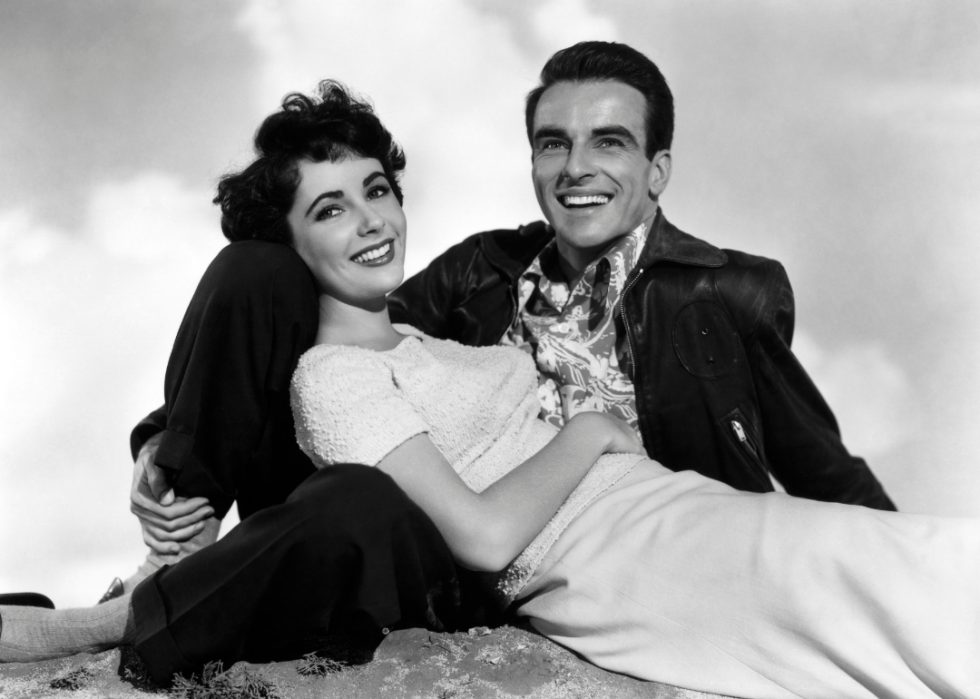
1951: Lifelong friends
On the set of "A Place in the Sun," Taylor met Montgomery Clift, to whom she was cast opposite. Clift and Taylor became best friends, a relationship that would last until his death in 1966. In 1956, during the shooting of "Raintree County," for which Taylor received an Oscar nomination for Best Actress, Clift left Taylor's house after a party and got into a serious car crash. Taylor rushed to the scene and arrived in time to pull Clift's dislodged teeth out of his throat, saving him from choking. He never recovered from the accident, despite plastic surgery, and developed substance use issues from constant pain. His slow decline and death is referred to as the "longest suicide in Hollywood."
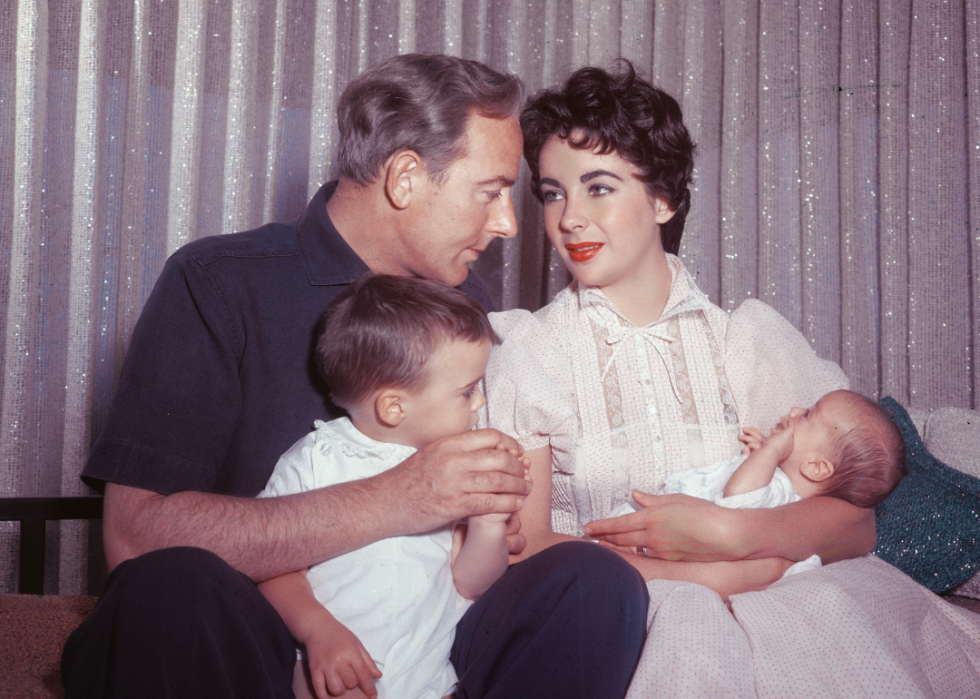
1952-57: Second shot at marriage
Taylor met British actor Michael Wilding on the set of "Ivanhoe" and proposed to him. He was 20 years her senior. They were married for five years and had two sons, Michael (b. 1953) and Christopher (b. 1955), both delivered by C-section. Eventually, their age gap and different career stages began to take their toll on the marriage. They amicably separated in 1956 and officially divorced in 1957.
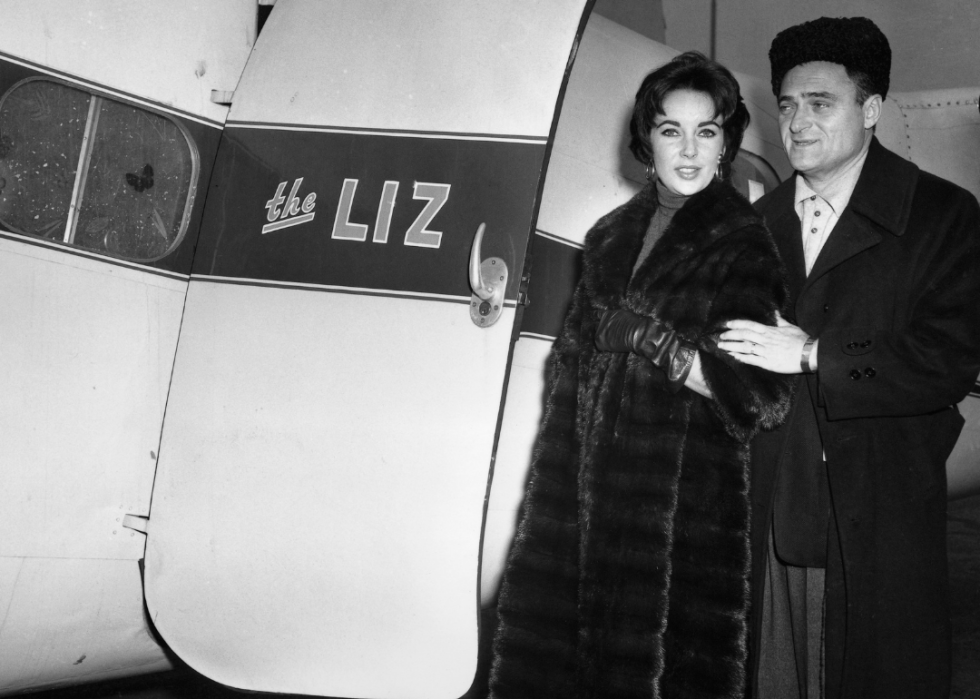
1957-58: Love, tragedy, and a change of faith
In 1957, Taylor married Mike Todd, a film producer 23 years her senior, in Mexico. They had a daughter, Liza, also born by C-section. Tragically, Todd died in a 1958 plane crash a mere year after their wedding, while aboard his private plane named "The Lucky Liz." After Todd's death, Taylor converted to Judaism as a way of honoring her late husband, who was Jewish. Later, Taylor said that Todd was one of the "three true loves of her life," along with her future husband, Richard Burton, and her jewelry.
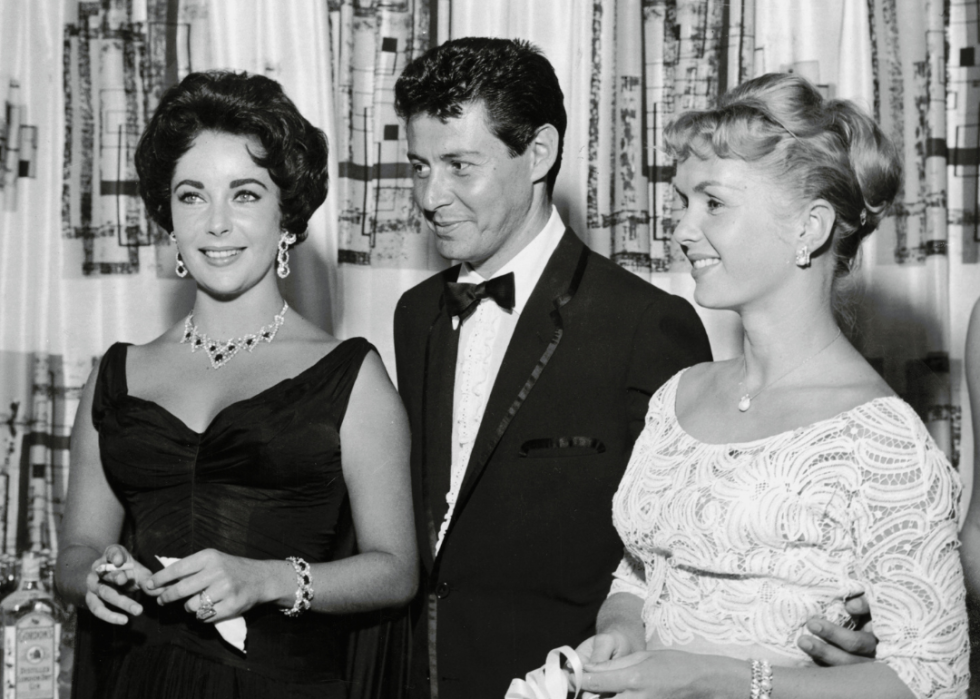
1959: Love triangle
After completing filming for "Cat on a Hot Tin Roof" in 1959 (for which she received an Oscar nod), which had been interrupted by Mike Todd's death and Taylor's withdrawal for several months, Taylor married Eddie Fisher, who had been Todd's best friend and the best man at their wedding two years prior. Making the situation more complicated was the fact that Fisher abandoned his wife, Debbie Reynolds, who was Taylor's best friend and had served as her matron of honor at the Todd-Taylor wedding, to be with Taylor. Despite the ensuing media scandal, Taylor and Reynolds rekindled their friendship in 1966.
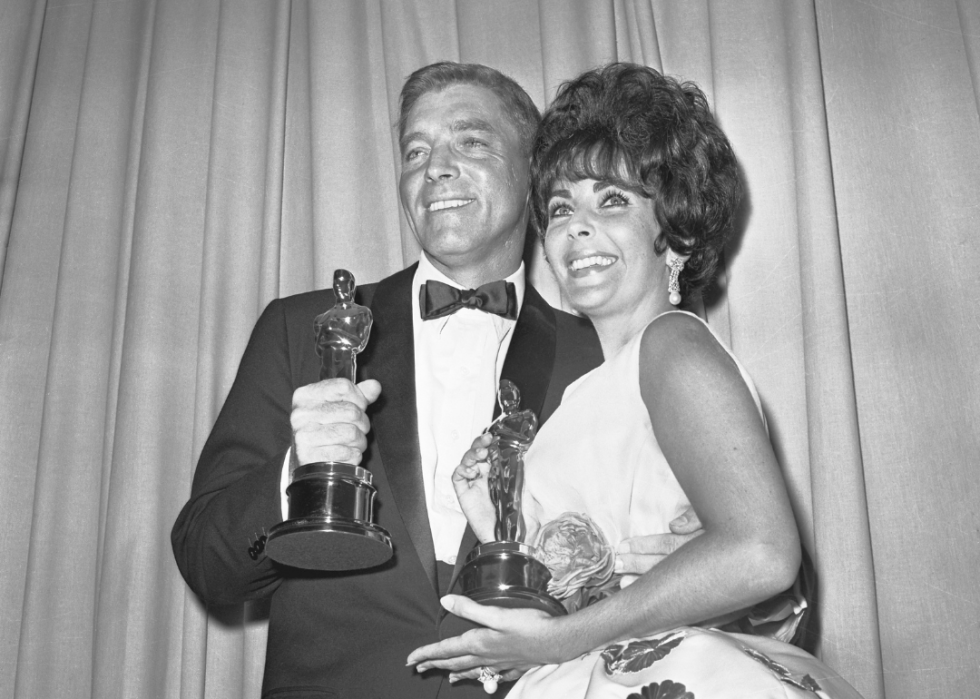
1961: First Oscar win
Taylor won her first Oscar for Best Actress for the film "BUtterfield 8" in 1961, in which she acted alongside her husband, Eddie Fisher. It was while working on "Suddenly, Last Summer" that she was offered the iconic role of Cleopatra. She jokingly asked for $1 million for the job, and 20th Century Fox agreed, making her the highest-paid performer in the history of Hollywood at the time.
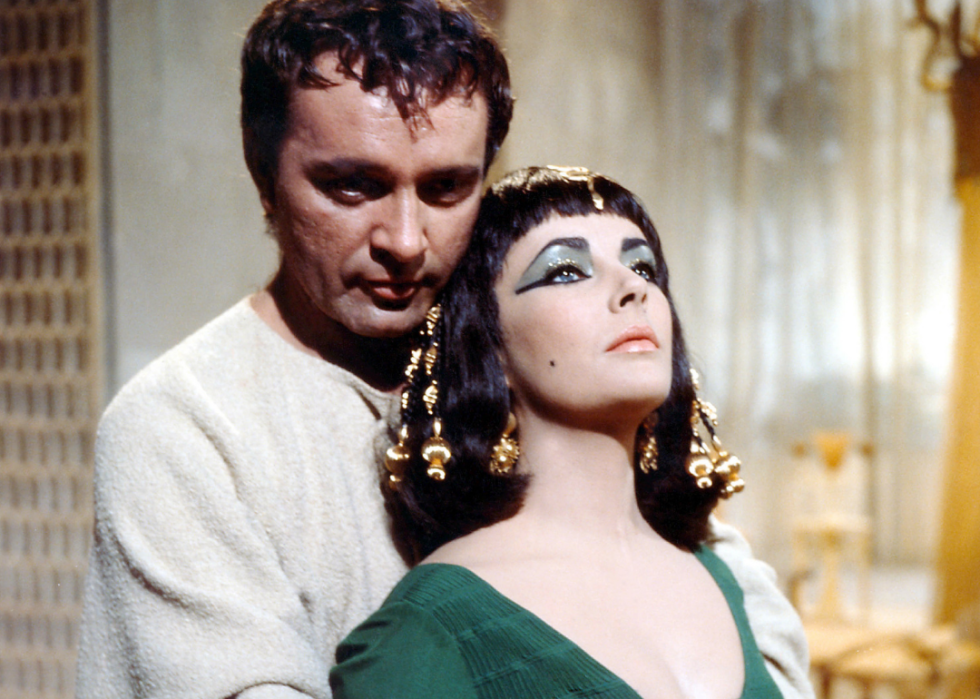
1962-64: Cleopatra and Richard Burton
After Taylor experienced a series of illnesses, delaying the start of "Cleopatra," the production was moved to Rome and the leading male actors were recast, with Rex Harrison and Richard Burton as Julius Caesar and Mark Antony, respectively. Almost immediately, Burton and Taylor fell for each other, despite both being married at the time of filming. Their affair caused a massive scandal across the world and finally ended in both divorcing their previous spouses in order to marry each other in 1964.
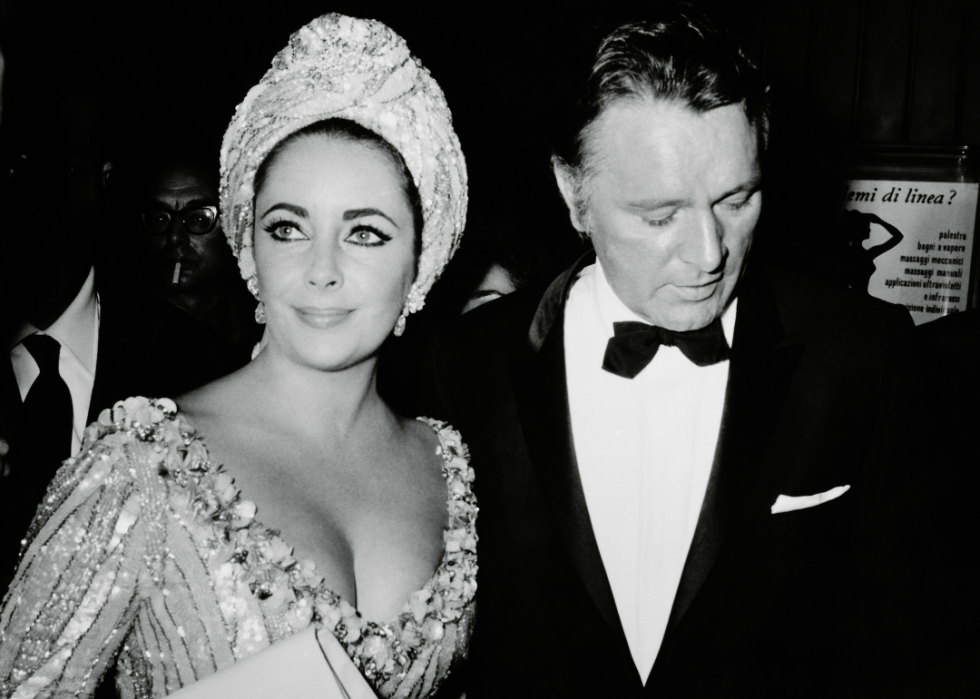
1964-75: The tumultuous Burton years
Taylor and Richard Burton stayed married for 10 years, but their marriage was as scandalous and scrutinized as their affair. Known publicly as the "Battling Burtons" for the intensity of their fights, they regularly broke furniture, screamed at each other, and even came to physical blows. Their extravagant lifestyle was also a frequent source of media speculation, with Burton buying Taylor millions of dollars worth of jewels, expensive pieces of art, a private yacht and plane, and several homes. After divorcing in 1974, they remarried and divorced again within the span of one year. Despite the tumult, Taylor said that, after Burton's death in 1984, she had always expected they would end up together again.
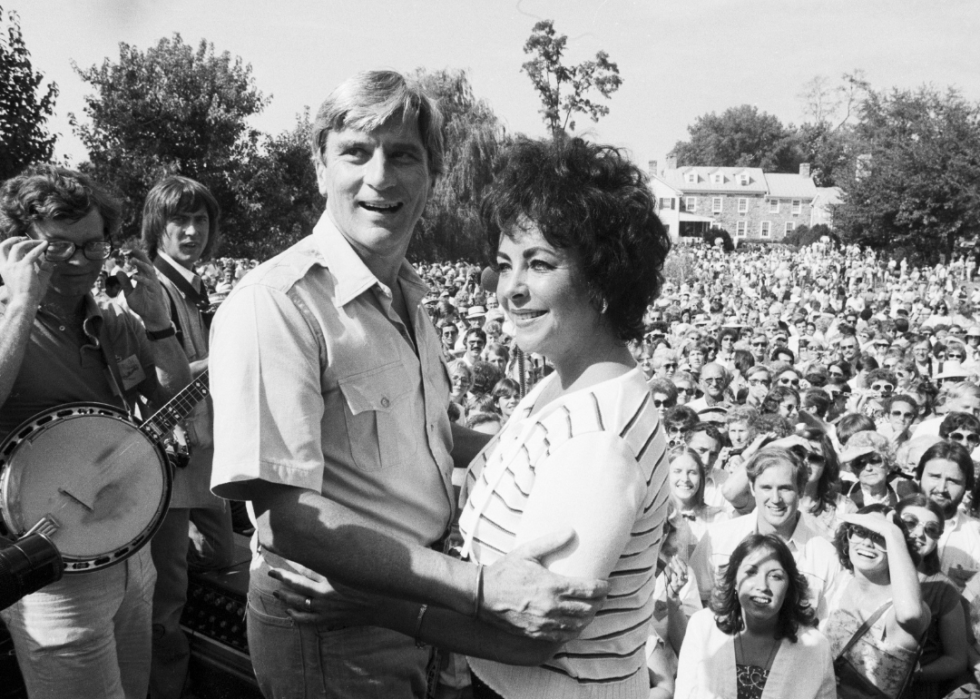
1976-82: A break from acting
After meeting and marrying former Navy secretary John Warner in 1976, Taylor stepped back from acting and worked hard on her husband's Senate campaign. After a busy decade of movies—having picked up another Oscar for Best Actress in 1967 for her role in "Who's Afraid of Virginia Woolf?"—her emotionally draining relationship with Burton, health scares and heavy drinking, and adopting another child, Taylor was ready to take a break. But this hiatus didn't last long. Warner was elected to the Senate in 1979 and Taylor, growing bored with life as a senator's wife, decided to return to acting and divorced Warner in 1982. After the divorce, she sought out treatment for drug and alcohol dependency.
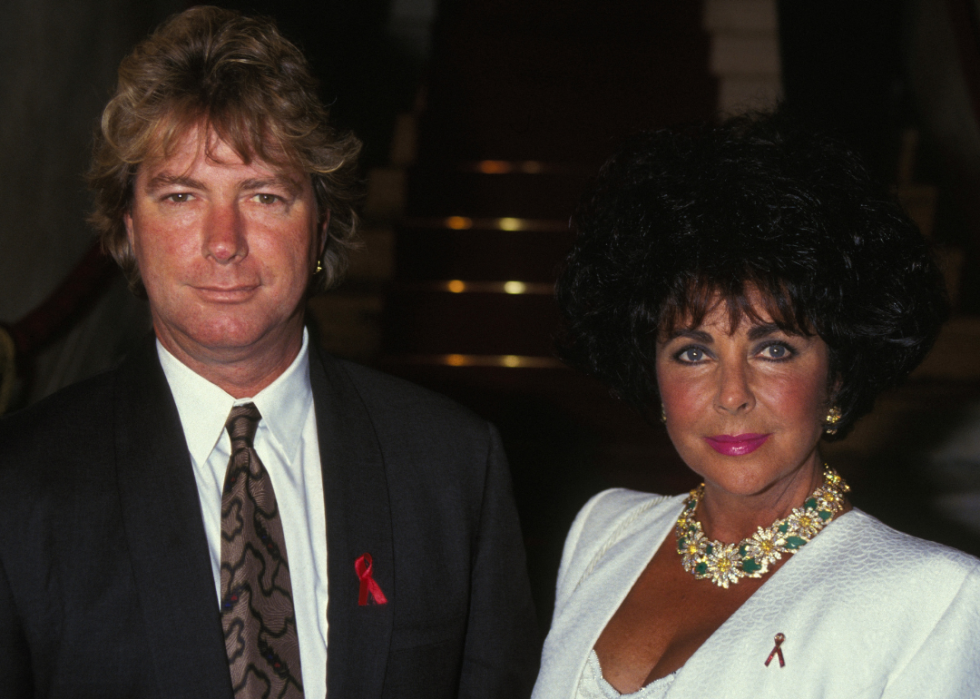
1988-96: One last marriage
It was while at the drug and alcohol rehabilitation center that Taylor met her seventh and final husband, Larry Fortensky, a construction worker who was also seeking treatment at the center. They got married in 1991 at Neverland Ranch owned by Michael Jackson, with whom Taylor had forged a close friendship. After five years, Taylor and Fortensky divorced, with Fortensky citing the stresses of being in the spotlight. By the early '90s, Taylor had mostly retired from acting.
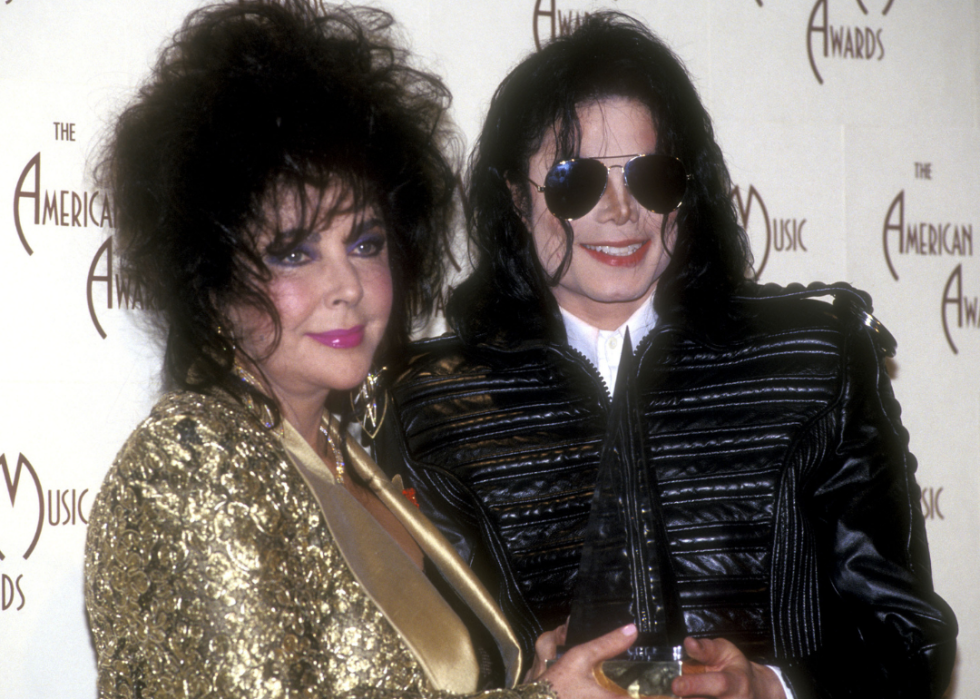
1984-2009: Unconventional friendship with Michael Jackson
Following the death of Richard Burton in 1984, Taylor became acquainted with Michael Jackson when he gifted her tickets to his tour. They quickly became very close friends, a relationship that persisted after accusations involving Jackson sexually abusing a child began surfacing. Taylor was a vocal supporter of his in 2005 when Jackson was tried in court and ultimately acquitted of the charges.
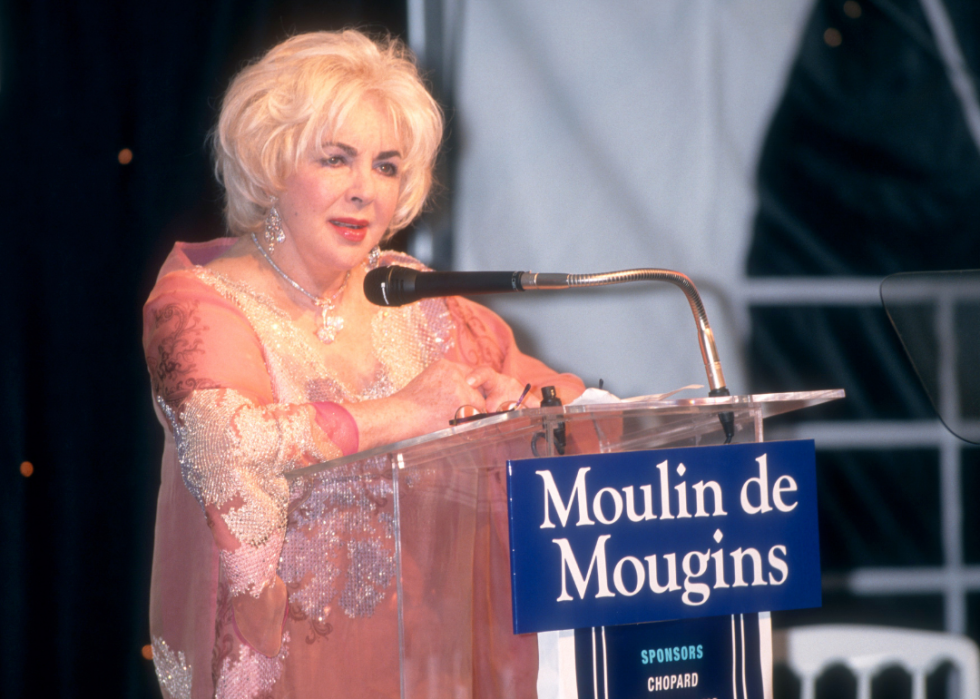
1985-2000: Philanthropy and awards
In 1985, Taylor co-founded the American Foundation for AIDS Research with several Centers for Disease Control and Prevention doctors, merging the AIDS Medical Foundation with the National AIDS Research Foundation. She is thought to have gotten involved in AIDS research following the death of her close friend, Rock Hudson, who died of AIDS in 1985. In 1987, she received the French Legion of Honour, and six years later, was awarded the American Film Institute's Lifetime Achievement Award. In 2000, she was made a dame.
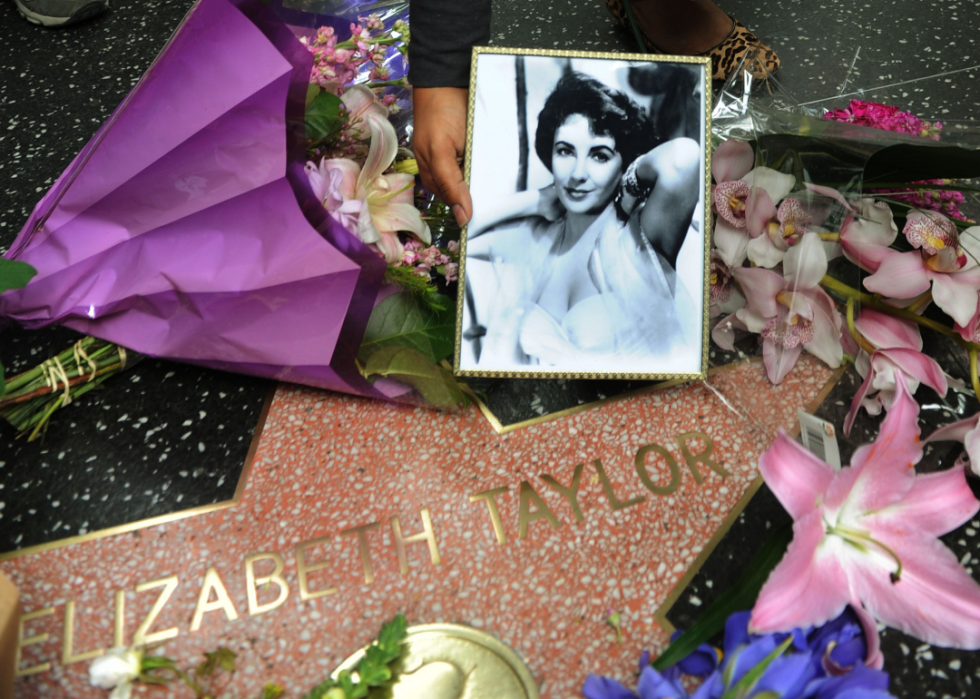
2011: Her final resting place
Taylor survived an extraordinary number of health scares over the years. Among them include suffering a stroke that caused her to have a brain tumor surgically removed in 1997, undergoing radiation for skin cancer in 2002, and having spinal surgery in 2004 to treat seven compression fractures in her spine. Finally, after being diagnosed with congestive heart failure seven years prior, Taylor died of the condition at the age of 79. Taylor was buried at Forest Lawn Memorial Park just outside of LA, in a plot near that of Michael Jackson.



